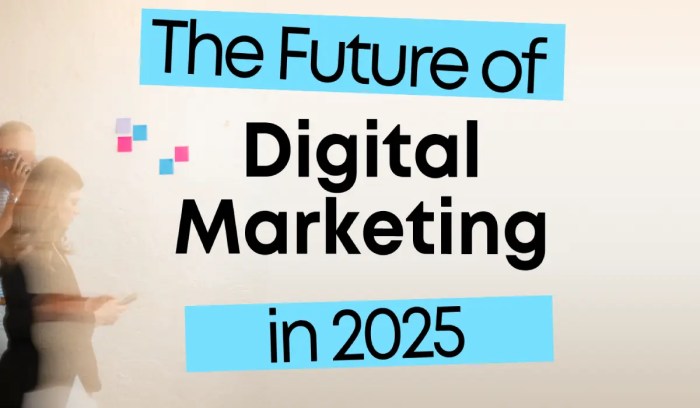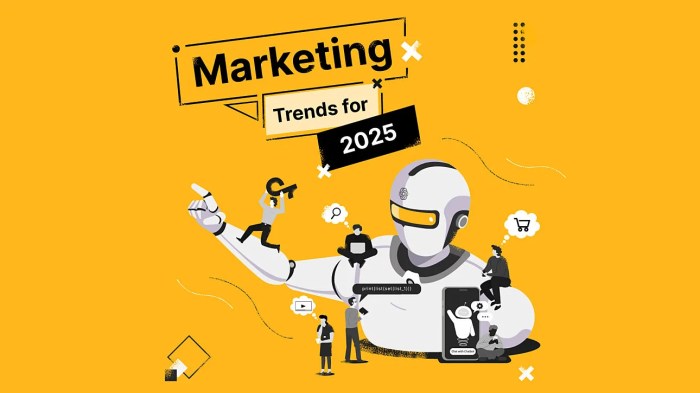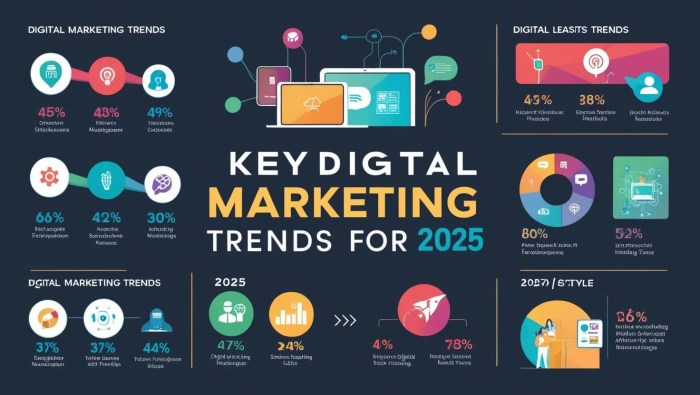Exploring Digital Marketing Trends 2025: A Glimpse into the Future
As we delve into the realm of digital marketing trends for 2025, we uncover a landscape brimming with innovation and transformation. From the profound impact of evolving technologies to the impending shift in consumer behavior, this exploration promises to be a fascinating journey through the digital marketing horizon.
The impending changes and advancements in digital marketing trends are poised to redefine the way businesses engage with their audience, paving the way for new strategies and opportunities.
Overview of Digital Marketing Trends 2025
In the fast-paced world of digital marketing, staying ahead of emerging trends is crucial for businesses to remain competitive and relevant. As we look ahead to 2025, it's essential to understand the shifting landscape of digital marketing and the impact of technological advancements on shaping future trends.
Significance of Staying Updated
Keeping up with the latest digital marketing trends is vital as it enables businesses to adapt their strategies to meet the evolving needs of their target audience. By staying updated, companies can leverage new technologies and platforms to reach customers more effectively and drive better results.
Impact of Technological Advancements
Technological advancements such as artificial intelligence, virtual reality, and voice search are expected to play a significant role in shaping digital marketing trends in 2025. These innovations will provide marketers with new ways to engage with consumers and deliver personalized experiences.
Comparison of Current and Projected Trends
- Current Trend: Influencer Marketing
Influencer marketing has been a popular strategy in recent years, but in 2025, it is projected to become even more targeted and data-driven, focusing on micro-influencers with niche audiences.
- Projected Trend: Augmented Reality Marketing
Augmented reality is expected to revolutionize the way brands interact with consumers, offering immersive and interactive experiences that drive engagement and sales.
- Current Trend: Video Content
Video content has been dominant in digital marketing, but in 2025, it is anticipated to become even more personalized and interactive, leveraging AI technologies to deliver tailored experiences.
Artificial Intelligence in Digital Marketing

Artificial intelligence (AI) is playing a significant role in revolutionizing digital marketing strategies by enabling marketers to personalize their campaigns, automate processes, and analyze data more effectively.
Personalized Marketing Campaigns
AI applications in digital marketing allow for the creation of personalized marketing campaigns tailored to individual consumer preferences. By analyzing user behavior and data, AI can recommend products, send targeted emails, and deliver customized content to enhance the overall customer experience.
- AI-powered recommendation engines on e-commerce platforms like Amazon suggest products based on user browsing and purchase history.
- Email marketing platforms utilize AI to send personalized messages to subscribers, increasing engagement rates.
- Dynamic website content powered by AI adjusts in real-time based on user interactions, creating a more personalized browsing experience.
Automating Marketing Processes
AI streamlines marketing processes by automating tasks such as data analysis, ad targeting, and content creation. This automation saves time and resources while improving the efficiency of marketing campaigns.
- Chatbots powered by AI provide instant customer support, answering queries and guiding users through the sales funnel.
- AI algorithms analyze large datasets to identify trends and insights, helping marketers make data-driven decisions.
- Programmatic advertising uses AI to optimize ad placements and target specific audience segments with precision.
Ethical Considerations
The use of AI in digital marketing raises ethical considerations related to data privacy, transparency, and bias. Marketers must ensure that AI algorithms are used responsibly and ethically to maintain consumer trust and avoid potential controversies.
- Transparency in AI decision-making processes is crucial to maintain trust with consumers and avoid deceptive practices.
- Data privacy concerns arise when AI collects and analyzes personal information for targeted advertising, requiring strict compliance with regulations like GDPR.
- Addressing bias in AI algorithms is essential to prevent discriminatory practices and ensure fair treatment of all individuals in marketing campaigns.
Voice Search Optimization

In the ever-evolving digital landscape of 2025, optimizing content for voice search is becoming increasingly important as more users rely on voice assistants for quick and convenient search results. Businesses need to adapt their strategies to ensure they are visible and easily accessible through voice search technology.
Importance of Optimizing for Voice Search
With the rise of voice assistants like Siri, Alexa, and Google Assistant, optimizing content for voice search is crucial for businesses to stay competitive in the digital space. Voice search queries are often conversational and longer, requiring a different approach to targeting and content optimization.
- Focus on natural language s and long-tail phrases to align with how users speak when using voice search.
- Create content that directly answers common questions related to your business or industry to improve chances of being featured in voice search results.
- Ensure your website is mobile-friendly and loads quickly to provide a seamless user experience for voice search users.
Impact of Voice Assistants on Search Behavior
Voice assistants have revolutionized the way people search for information online, shifting towards hands-free and voice-activated searches. This change in user behavior has led to an increased demand for voice search optimization to meet the evolving needs of consumers.
Voice search is expected to account for 50% of all searches by 2025, highlighting the growing importance of optimizing content for voice-enabled devices.
- Businesses can leverage voice search optimization to improve brand visibility and attract new customers who prefer voice-activated search methods.
- Voice assistants provide personalized and instant responses, influencing user decisions and purchase behaviors, making voice search optimization a valuable tool for businesses.
Challenges and Opportunities in Voice Search Optimization
While voice search optimization presents new opportunities for businesses to reach a wider audience, it also comes with its own set of challenges that need to be addressed for effective implementation.
- One challenge is the need to adapt content for different voice assistants, as each platform may have its own unique requirements for optimal performance in voice search results.
- Opportunities lie in creating interactive voice-optimized content such as podcasts, tutorials, and FAQs to engage users and enhance brand visibility in voice search queries.
Augmented Reality (AR) and Virtual Reality (VR) Marketing
Augmented Reality (AR) and Virtual Reality (VR) technologies are revolutionizing the landscape of marketing by offering immersive and interactive experiences to consumers. These innovative technologies blur the lines between the digital and physical worlds, creating unique opportunities for brands to engage with their audience in new and captivating ways.
Successful AR/VR Marketing Campaigns and Impact
- One of the most notable AR marketing campaigns was by IKEA with their "IKEA Place" app, allowing customers to visualize furniture in their homes before making a purchase. This campaign significantly increased customer engagement and sales.
- Similarly, the Pokémon GO game leveraged AR technology to bring the virtual world of Pokémon into the real world, resulting in a viral sensation that boosted brand awareness and engagement.
- VR marketing campaigns like the "Mercedes-Benz Mixed Tape" VR experience offered users a virtual test drive of their cars, enhancing the brand's image and driving customer interest.
Potential of AR/VR in Enhancing Customer Engagement and Brand Experiences
- AR and VR technologies provide a more immersive and personalized experience for consumers, leading to increased engagement and brand loyalty.
- Brands can use AR/VR to create interactive product demonstrations, virtual shopping experiences, and gamified marketing campaigns to captivate their audience.
- AR/VR can also help in storytelling and creating memorable brand experiences that leave a lasting impression on customers.
Industries Benefiting the Most from AR/VR Marketing Strategies
- Retail and e-commerce industries can leverage AR/VR for virtual try-on experiences, enhancing the shopping process and reducing returns.
- Real estate companies utilize AR to showcase properties in 3D, giving potential buyers a virtual tour of homes without physically visiting them.
- Travel and tourism industry can offer virtual destination experiences to entice travelers and provide a preview of their future trips.
- Entertainment and gaming sectors continue to explore AR/VR technologies for immersive content delivery and engaging experiences for users.
Last Point

In conclusion, the landscape of digital marketing in 2025 holds a tapestry of possibilities and challenges, beckoning marketers to adapt and innovate in an ever-evolving digital ecosystem. By embracing these trends, businesses can position themselves at the forefront of a dynamic and competitive market, ready to seize the opportunities that lie ahead.
General Inquiries
How important is it for businesses to stay updated with digital marketing trends for 2025?
Staying updated with digital marketing trends in 2025 is crucial for businesses to remain competitive, adapt to changing consumer behavior, and capitalize on emerging opportunities.
What are the potential benefits of integrating Artificial Intelligence in digital marketing strategies for 2025?
Integrating AI can enhance personalization, automate marketing processes, improve targeting, and provide valuable insights for more effective campaigns in 2025.
How can businesses optimize their content for voice search in the upcoming digital landscape?
Businesses can optimize content for voice search by focusing on conversational s, providing clear and concise answers, and structuring content to align with user intent in 2025.
Which industries are likely to benefit the most from AR/VR marketing strategies in 2025?
Industries such as retail, real estate, tourism, and entertainment are poised to benefit significantly from AR/VR marketing strategies in 2025, enhancing customer engagement and brand experiences.